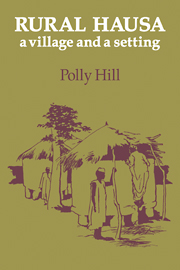Book contents
- Frontmatter
- Contents
- List of tables
- List of illustrations
- Preface
- List of abbreviations and conventions
- Map of Hausaland (after Morgan and Pugh, 1969)
- I Introduction
- II Batagarawa
- III Fathers and sons in gandu
- IV The evidence for economic inequality
- V Further aspects of inequality
- VI The sale of manured farmland
- VII Migration
- VIII Farm-labouring
- IX Local trade in grains and groundnuts
- X Individual poverty
- XI Individual viability
- XII Short-term stability
- XIII The absence of ‘class’
- XIV Concluding speculations
- Commentary, including Hausa glossary
- Bibliography
- Index
- Frontmatter
- Contents
- List of tables
- List of illustrations
- Preface
- List of abbreviations and conventions
- Map of Hausaland (after Morgan and Pugh, 1969)
- I Introduction
- II Batagarawa
- III Fathers and sons in gandu
- IV The evidence for economic inequality
- V Further aspects of inequality
- VI The sale of manured farmland
- VII Migration
- VIII Farm-labouring
- IX Local trade in grains and groundnuts
- X Individual poverty
- XI Individual viability
- XII Short-term stability
- XIII The absence of ‘class’
- XIV Concluding speculations
- Commentary, including Hausa glossary
- Bibliography
- Index
Summary
As most publications relating to Hausaland have long historical introductions, there is good reason not to follow suit. So this book, on socio-economic life in a Hausa village, opens with no more than a few general observations on historical, administrative, ethnic, linguistic and other background matters, the general reader being referred to a number of specialist studies, such as those from which citations have been drawn, where far more detail may be found.
The Hausa people are settled mainly between 10½ and 13½ degrees North and 4 to 10 degrees East (see Fig. 1) in a huge area, mainly in the north of Nigeria but also in the south of the Niger Republic, which essentially consists of the basin of the Sokoto river and its tributaries to the west, and of a great plateau to the east.
The Hausa enjoy a high degree of cultural, linguistic and religious uniformity; the differing patterns of social and economic organization relate rather to the contrast between rural and urban life than to ethnic differentiation. Politically, Hausaland has for long comprised a number of emirates owing a common allegiance to the Caliph (Sultan) of Sokoto. Each emirate was centred upon a capital town (birni) in which the Emir (sarki) resided. The ruling-class was predominantly Fulani in origin. The high degree of cultural assimilation of this ruling-class with the culture of Hausa commoners has, however, mitigated against the continuance of ethnic exclusivity.
- Type
- Chapter
- Information
- Rural HausaA Village and a Setting, pp. 1 - 9Publisher: Cambridge University PressPrint publication year: 1972
- 1
- Cited by

